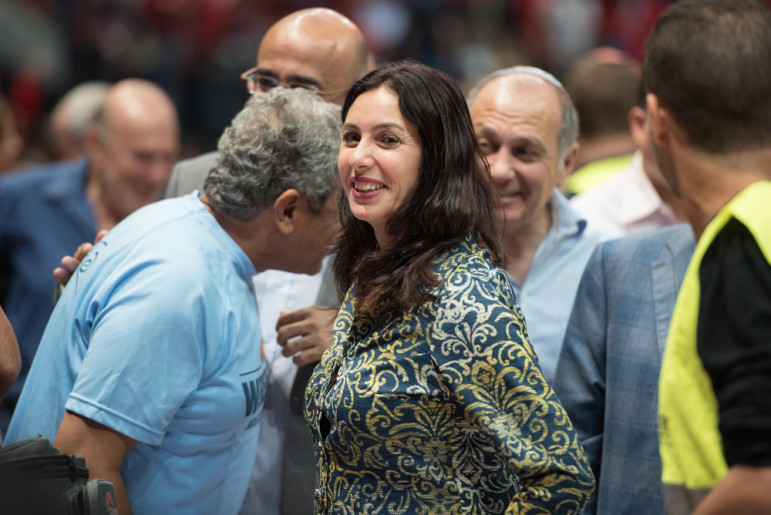
January 30, 2016; Washington Post (Associated Press) and Ha’aretz
Writing from Jerusalem for the Associated Press, Tia Goldenberg takes note of a cultural movement rising in Israel that leans heavily on the nation’s religious traditions:
A nationalist-religious right is rising that lends more emphasis to Israel’s character as a Jewish state, rather than one that is equally Jewish and democratic. […] For months, with Israel mired in a wave of near-daily violence with the Palestinians, hardline lawmakers and activist groups have been stepping up pressure on dovish opponents, primarily rights groups who are critical of government policies in the West Bank.
In the wake of a campaign to identify liberal political action and social service groups as threats to Israel’s future, a new ad campaign launched last week by Im Tirtzu (“if you will it”) specifically targeted Israeli cultural icons who they viewed as “traitors.” According to the Israeli daily Ha’aretz:
The new campaign, which follows in the footsteps of the group’s recent video in which it “outed” individuals associated with human rights groups as foreign “moles,” attacks several of Israel’s most well-known artists, including writers Amos Oz, David Grossman and A.B. Yehoshua, actor Gila Almagor, and singers Rona Keinan and Chava Alberstein. […] Matan Peleg, the CEO of Im Tirtzu [said] that artists regularly come out against elected officials with “slanderous campaigns,” while “hiding the fact that they’re members of mole organizations.” “The public has all rights to know these details. We’ll not allow mole organizations to throw dust in the eyes of the public.”
Some on the list published by Im Tirtzu have responded publically. Writer Ronit Matalon called the group “a bunch of hooligans” and said, “The problem is that the more isolated the country gets, the more it is perceived as a leper, it starts attacking itself, with complete lack of understanding. We should show persistent and determined resistance. We should resist and not be afraid.”
Sign up for our free newsletters
Subscribe to NPQ's newsletters to have our top stories delivered directly to your inbox.
By signing up, you agree to our privacy policy and terms of use, and to receive messages from NPQ and our partners.
Im Tirtzu’s campaign also drew condemnation from political leaders across the spectrum, from Israeli Prime Minister Benjamin Netanyahu, who said he “opposes using the term traitor for those who disagree with me,” to Yair Lapid, head of the centrist Yesh Atid party, who wonders, “Have they lost their minds? This campaign of hate and incitement to violence by Im Tirtzu crosses a red line.” In the face of this strong reaction, Im Tirtzu issued an apology—but just for the tone of its efforts.
We made a mistake. […] We take full responsibility and promise to continue to work with great faith on behalf of the people of Israel and the soldiers of the IDF. […] We will continue to convey pointed criticism of organizations that present IDF soldiers as war criminals and against those calling for a boycott of the country.
Even if many view the harsh language used by Im Tirtzu as a bit much, their objective still seems to have broad support. On Wednesday, Culture Minister Miri Regev will propose new legislation—a “cultural loyalty” law that, she says, aims “to make support for a cultural institution dependent on its loyalty to the State of Israel.” The effort to enact this new law followed Regev’s unsuccessful effort to use existing regulations to cut support to A Parallel Time, a play performed at the Al-Midan Theater in Haifa that was inspired by the story of a Palestinian serving a life sentence for murder.”
Last week, she explained her motivations in a speech. “I will not allow the state to fund —in the name of freedom of expression—activities that undermine the very existence of the state of Israel as a Jewish and democratic state.”
The weight of a 50-year struggle to find a permanent solution that both Israelis and Palestinians will value and see as the way to a better tomorrow is having a corrosive effect on Israel. Can it continue to be the open, vibrant society that has allowed a wide divergence of opinion to be part of the public arena? Or will the ongoing threat and assault felt by many Jewish Israelis push it to become a narrower and more controlled society? Right now, the forces wanting greater conformity, “loyalty,” and control appear to be winning that debate.—Martin Levine












